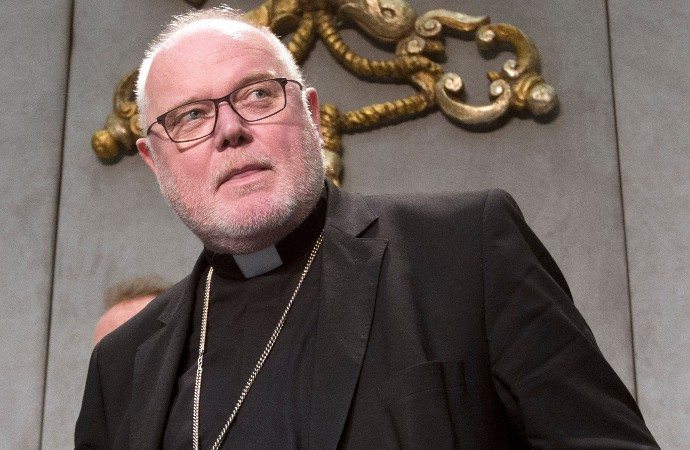Since the beginning of the clerical abuse crisis, some voices in Catholicism have warned that going too far towards secular standards of transparency and corporate “best practices” could ruin the reputations of innocent priests by circulating false allegations, as well as eroding traditional guarantees of pontifical secrecy.
On Saturday, bishops gathered for a special summit heard one of their own, German Cardinal Reinhard Marx, tell them bluntly that such arguments just aren’t “particularly forceful.”
“The protection of rights and transparency are not mutually exclusive,” Marx said. “The opposite is the case.”
“A clearly defined and public procedure,” the German prelate said, “is the best safety mechanism against prejudices and false judgments. Such a procedure has the credibility to restore the reputation of a wrongly accused person who otherwise would be subject to rumors.”
Ultimately, Marx said, the aim of building and maintaining effective administrative procedures in dealing with abuse cases is to “bring humanity to God.”
“I get letters from victims still today about how Church administration is dealing with them,” he said. “The thoughts of some abuse victims can be summarized like this: If the Church claims to act in the name of Jesus and yet I’m treated so badly, then I want nothing to do with this Jesus.”
Marx listed several qualities an effective Church response should possess.
“Administration should take place in such a way that people feel accepted and appreciated, they feel they can trust the system, they feel secure and fairly treated, that they’re listened to and legitimate criticism is accepted,” he said.
Marx bluntly said that hasn’t always been the case.
“Files that could have documented these terrible deeds and those responsible were destroyed, or not even created,” he said. “Instead of perpetrators, the victims were administered and their voices suppressed.”
A key ally and adviser to Pope Francis, Marx ticked off several elements of what a Church response featuring both “traceability and transparency” would look like.
First, he called for rethinking the scope of pontifical secrecy. Data protection, he suggested, is a legitimate aim, but concealing allegations and administrative procedures is not. Pushing the requirements of secrecy too far, he warned, “exposes us to the suspicion of cover-up.”
Second, Marx suggested an examination of “norms and rules” for the Church’s internal system of justice on abuse cases.
“The Church must not operate below the quality standards of public administration of justice, if it doesn’t want to face criticism that it has an inferior legal system that’s harmful to people,” he said.
Third, Marx recommended releasing data on abuse allegations “as far as possible,” arguing that it’s the only way to combat “public mistrust,” which, he said, “leads to conspiracy theories and the formation of myths about an organization.”
“When you give the impression you’re hiding something, that won’t be successful,” he said.
The comments are especially relevant in light of controversy that arose on Friday after Francis distributed a set of 21 “points for reflection” to the summit, saying they had come from suggestions from bishops’ conferences and other Church entities. One of those points expressed caution about revealing information on accused parties before a “definitive condemnation,” as opposed to the practice in Germany, the U.S. and other places of releasing names of clergy against whom a credible allegation has been lodged.
Fourth, Marx said the results of the Church’s internal legal proceedings, including the reasons for findings in particular cases, should be released to the public.
“Publication establishes trust in the organization and its leadership,” he said.
Joking about the legendary Teutonic passion for organization and structure, Marx laughingly insisted that attention to such matters isn’t just a “German, or Swiss and American” preoccupation.
“There’s a need for good and fully functional administration, oriented to the goals of the Church and based on the principle of justice,” he insisted.
“It prevents forgetfulness and preserves matters beyond this moment. It promotes reliability and fidelity to one’s own word,” he said. “It objectifies [situations] by creating and enforcing rules and laws and helps prevent arbitrariness.”
Marx suggested that the push for better administration as a result of the abuse crisis could be of help to the Church in other areas as well.
“For example, [it could help] in the area of finances, another area where there are scandals in the Church,” he said.
“This might be a test case also for other points,” he said. “I hope this meeting will be such a step in a courageous future for the Church.”
The day before he addressed the bishops, Marx, who also serves as president of the German bishops’ conference, met a group of 16 abuse survivors who belong to the activist group “Ending Clergy Abuse.” According to a notice published by the Vatican’s official news service, he briefed Francis on the results of that meeting.

